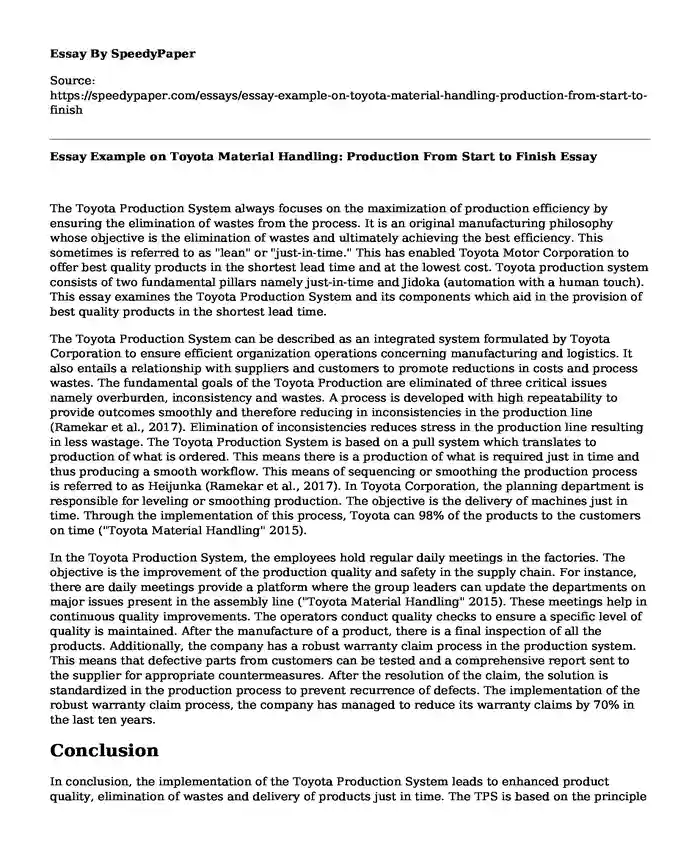
| Type of paper: | Essay |
| Categories: | Toyota Supply chain management |
| Pages: | 3 |
| Wordcount: | 595 words |
The Toyota Production System always focuses on the maximization of production efficiency by ensuring the elimination of wastes from the process. It is an original manufacturing philosophy whose objective is the elimination of wastes and ultimately achieving the best efficiency. This sometimes is referred to as "lean" or "just-in-time." This has enabled Toyota Motor Corporation to offer best quality products in the shortest lead time and at the lowest cost. Toyota production system consists of two fundamental pillars namely just-in-time and Jidoka (automation with a human touch). This essay examines the Toyota Production System and its components which aid in the provision of best quality products in the shortest lead time.
The Toyota Production System can be described as an integrated system formulated by Toyota Corporation to ensure efficient organization operations concerning manufacturing and logistics. It also entails a relationship with suppliers and customers to promote reductions in costs and process wastes. The fundamental goals of the Toyota Production are eliminated of three critical issues namely overburden, inconsistency and wastes. A process is developed with high repeatability to provide outcomes smoothly and therefore reducing in inconsistencies in the production line (Ramekar et al., 2017). Elimination of inconsistencies reduces stress in the production line resulting in less wastage. The Toyota Production System is based on a pull system which translates to production of what is ordered. This means there is a production of what is required just in time and thus producing a smooth workflow. This means of sequencing or smoothing the production process is referred to as Heijunka (Ramekar et al., 2017). In Toyota Corporation, the planning department is responsible for leveling or smoothing production. The objective is the delivery of machines just in time. Through the implementation of this process, Toyota can 98% of the products to the customers on time ("Toyota Material Handling" 2015).
In the Toyota Production System, the employees hold regular daily meetings in the factories. The objective is the improvement of the production quality and safety in the supply chain. For instance, there are daily meetings provide a platform where the group leaders can update the departments on major issues present in the assembly line ("Toyota Material Handling" 2015). These meetings help in continuous quality improvements. The operators conduct quality checks to ensure a specific level of quality is maintained. After the manufacture of a product, there is a final inspection of all the products. Additionally, the company has a robust warranty claim process in the production system. This means that defective parts from customers can be tested and a comprehensive report sent to the supplier for appropriate countermeasures. After the resolution of the claim, the solution is standardized in the production process to prevent recurrence of defects. The implementation of the robust warranty claim process, the company has managed to reduce its warranty claims by 70% in the last ten years.
Conclusion
In conclusion, the implementation of the Toyota Production System leads to enhanced product quality, elimination of wastes and delivery of products just in time. The TPS is based on the principle of just-in-time and automation integrated with a human touch. The implementation of Toyota Production System concepts ensures that quality and safety is maintained. Heijunka which is an approach for leveling production ensures there is a reduction of wastes. This, in turn, means that quality products are delivered within schedule and there are minimal defects.
References
Ramekar, A., Muneshwar, V., Kute, A., & Choube, A. (2017). Concept of Heijunka. International Advanced Research Journal in Science, Engineering and Technology, 4(3), 219-223. doi: 10.17148/iarjset
Toyota Europe. (2015). Toyota Material Handling - Production from Start to Finish [Video]. YouTube.
Cite this page
Essay Example on Toyota Material Handling: Production From Start to Finish. (2023, Jan 04). Retrieved from https://speedypaper.net/essays/essay-example-on-toyota-material-handling-production-from-start-to-finish
Request Removal
If you are the original author of this essay and no longer wish to have it published on the SpeedyPaper website, please click below to request its removal:
- Essay Sample with Analysis of the Causes of Conflict in Pakistan
- Free Essay: Sales Techniques and Metrics
- Free Essay Comparing First Nations' and Indian Religions Views of Nature
- Ideology, Feminism and Pop Culture - Essay Sample for Your Inspiration
- Essay Sample: NextEra Energy Company
- Paper Example on Grue Paradox and the Ravens Paradox
- Paper Example on Google's Strategic Management: Overcoming Industry Challenges
Popular categories




